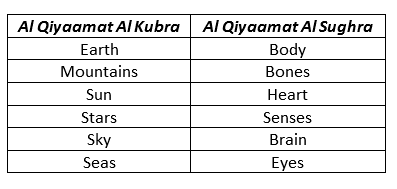Quranic Gems: Surah Al-Imran - Du'a and Jawab
There is something worth pondering over in Chapter Al-Imran, verses 190-194 and verse 195. (Indeed, all the verses of the Holy Quran are worth pondering over.)
Verses 190-194 refer to some individuals who are in
communication with their Lord. These people call out to Allah five times,
by exclaiming Rabbana (Our Lord!).
Indeed,
in the creation of the heavens and the earth and the alternation of night and
day, there are signs for those who possess intellect. Those who remember
Allah standing, sitting, and lying on their sides, and reflect on the creation
of the heavens and the earth [and say], ‘Our Lord , You have not created this in vain! Immaculate are You! Save
us from the punishment of the Fire. Our Lord , whoever that You make enter the Fire will surely have been
disgraced by You, and the wrongdoers will have no helpers. Our Lord , we have indeed heard a summoner calling to faith,
declaring, ‘‘Have faith in your Lord!’’ So we believed. Our Lord , forgive us our sins and absolve us of our misdeeds, and
make us die with the pious. Our Lord , give us
what You have promised us through Your apostles, and do not disgrace us on the
Day of Resurrection. Indeed, You do not break Your promise.’ (Translation
by Qarai)
In verse 195, their Lord responds to them. There
seems to be a gem hidden in the reply which becomes evident if one looks at the
language used from the perspective of grammar. In classical Arabic there are
many ways to place emphasis on what is being said. Some of these are:
The use of Inna at the start of the sentence
(This is often left untranslated which is fine. It doesn’t always translate well,
but in some cases it can). This becomes Anna if it appears within a sentence.
The use of Laam (Laam al-Taukeed) at the
start of a verb (confines meaning to future tense).
The use of Nuun (Nuun al-Thaqeelah) at
the end of a verb (confines meaning to future tense).
We
can clarify the above with an example:
The verb تَرَوْنَ means "You (all) see”.
The
verb لَتَرَوُنَّ means “Indeed, you
(all) will definitely see!”.
The English translation sounds
unnatural because placing multiple emphasis in a sentence is not common in
English. But in Arabic, such emphasis enhances the verb, making it more impactful,
and provides rhetorical eloquence.
So
their Lord answered them, "Never will I allow to be lost the work of any of
you, be he male or female. You are (members) one of another, so those who
emigrated and were driven out from their homes, and suffered harm in My Cause,
and who fought, and were killed, verily, I will remit from them their evil deeds and
admit them into Gardens under which rivers flow ; a reward from Allah, and with
Allah is the best of rewards." (Modified Hilali and Khan
translation).
The
above translation manages two emphasis. In reality, there are five emphasis. Once
in Anni, and twice each in the following two verbs.
The
number of emphasis in the reply matches the number of times rabbana was exclaimed in the supplication!




The information you've shared in this blog is highly remarkable. Thanks for sharing such quality information.
ReplyDeletehttps://faizanquranacademy.com/our-courses/
learn Quran for kids